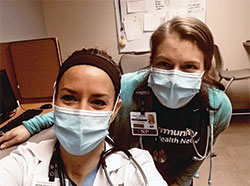‘I’ve drawn closer to God’
Health care workers rely on their faith as they serve on the front lines of pandemic

Nurse practitioners Katie Kennedy, left, and Gina Catanese are two of the dedicated health care workers who are taking care of COVID-19 patients at Community Hospital East in Indianapolis. (Submitted photo)
(Editor’s note: The Criterion interviewed three health care workers on the front lines of the coronavirus pandemic in Indiana, asking them to share their experiences in caring for people infected with this deadly disease—and how their Catholic faith has helped them during this challenging time. Here are their stories. Click to read the stories of Dr. Heidi Dunnaway and Catie Walden)
By John Shaughnessy
Katie Kennedy quickly realized the devastating impact of COVID-19 after she offered to assess infected patients—so that only one person from her group would get exposed to the deadly virus.
The nurse practitioner at Community Hospital East in Indianapolis saw how some patients declined rapidly—“from being fine, to being on a ventilator 12 hours later, to multi-organ failure.”
She was also there for the touching moment when her younger sister, Emily Norton—a nurse in the hospital’s intensive care unit—held the hand of a patient who was dying from the virus.
Then came the moment when the 35-year-old mother of three young children faced her own struggles with the deadly virus after working 12 straight days with about 10 patients.
She had a fever, back pain and shortness of breath that was so bad that she soon found herself at home “sitting in the middle of our steps to rest when going up or down them” and while walking to the mailbox.
When she tested positive for the coronavirus on March 30, she wasn’t surprised, but the fears were still there. She became one of the nearly 9,300 health care workers in the United States infected by the disease, according to an April 14 report from the Centers for Disease Control and Prevention. At least 27 American health care workers have died from the virus.
“I was scared because I saw how healthy people became so sick,” says Kennedy, a member of St. Pius X Parish in Indianapolis with her husband Sean and their children. “I was more concerned about spreading it to Sean, the kids, and my parents and Sean’s mother who had babysat the kids.”
Kennedy drew strength and support from a friend who had already recovered from the virus. There were also the prayers of friends, relatives and fellow parishioners as she stayed home for two weeks, trying to recover. The prayers were answered when she felt she had returned to her normal self by Easter Sunday.
The next day, on April 13, she returned to Community Hospital East to care for patients infected with the coronavirus. She announced her return in a Facebook post, declaring, “I’m lucky. I recovered when so many people have not.”
Her return to the front lines exemplifies why so many people consider health care workers as “heroes” during this pandemic. Yet Kennedy just views it as a reflection of what many people in health care have done consistently for years.
“I think most health care workers go into this field to help people,” she says. “I feel like it’s what I’m called to do. I enjoy being there for other people.”
She believes God has been there for her, too—and not just during her recovery.
“I’ve been able to see God through other people in this situation—through the nurses, the other health care workers, and the generosity of the community supporting health care workers. You get to see a lot of good in people. It renews your faith in people and in God.”
Even with their own health at risk, Kennedy has seen her co-workers rise to the occasion time after time.
“It’s amazing to see how the nurses have come together to be there for their patients when their families can’t be there for them” because of the potentially contagious and devastating nature of the virus.
The heartbreaking reality that family members of coronavirus patients can’t visit their loved ones led to another extra effort by the hospital staff. When it became clear that one patient was dying, Kennedy and her sister Emily met with the hospital’s palliative care director and IT leadership to develop a plan so the family could “see” the patient.
“We spent hours working out a way to get video into the room so that the patient’s family could see the patient one last time before the patient passed away,” Kennedy notes. “It was a great example of different disciplines coming together to help out a patient and their family.”
Such video connections have continued for patients and their families.
Kennedy also recalls one special moment when people associated with the hospital came together for a prayer service for a patient infected by the virus, a person of the Hindu faith. People united for the prayer service through a Zoom video connection.
“We prayed a rosary, and they shared some of their Hindu prayers. It was really neat to see how people have come together in faith.”
It’s been part of her own journey during this crisis.
“My faith has definitely helped me,” she says. “I’ve drawn closer to God.” †
